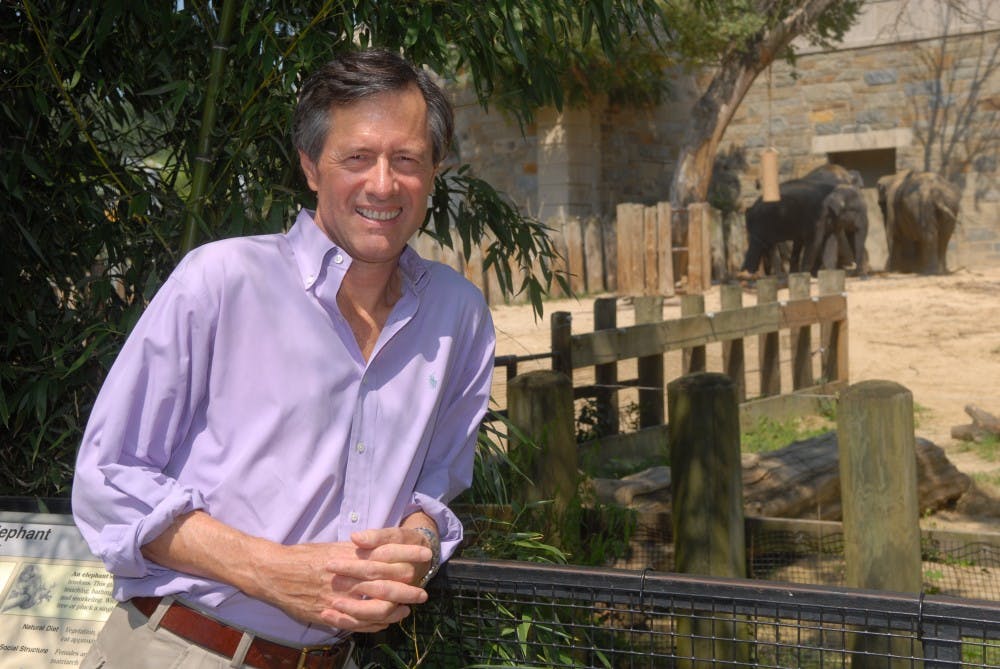Chris Palmer is one of AU’s most engaged and active professors both in the classroom and beyond. However, there is more to his life than teaching. Throughout his life Palmer has invested his time in pursuing a diverse spectrum of professions and interests.
Along with producing well over 50 films and being a professor in the School of Communication, Palmer has also been a high school boxing champion, officer in the Royal Navy, engineer, author, political appointee for the Environmental Protection Agency, founder of National Audubon Society Productions and stand-up comedian.
For the past 30 years, Palmer has produced and logged well over 300 hours of IMAX films and television programs. For his works, Palmer and his colleagues have received two Emmys for environmental features and one Oscar nomination for his film “Dolphins.”
Although being an environmental filmmaker may not come with all the riches and stardom that some in Hollywood receive, the profession does come with some significant perks.
Through out his career in environmental filmmaking Palmer has worked with celebrated actors and big names such as Paul Newman, Robert Redford, Jane Fonda, Ted Turner and Ted Danson. In addition to working with actors and celebrities, Palmer has also added his experience vocally to interviews and guest appearances on ABC Nightline, Today Show, NPR and Fox News Channel.
Being a conservationist at heart and founder of AU’s Center for Environmental Filmmaking, Palmer often stresses the importance of protection for animals of all kind.
“Compared to 20 years ago, we have now reached a crisis stage,” Palmer said in an email.. “For example, wild animals are going extinct at unprecedented rates. On Oct. 1, 2014, the World Wildlife Fund revealed that half of the animals on this earth have been destroyed since 1970.”
But environmental filmmakers also use what might be described as exploitative and unethical techniques to get an unnatural reaction from animals, Palmer said in an email. Palmer has admitted to making mistakes of his own.
Having a history of producing numerous wildlife documentaries, Palmer has admitted to staging tamed animals as wild for the means of achieving a scene in a film. Palmer alludes to his past along with the sensationalism that surrounds the works of many environmental filmmakers in his written book and film “Shooting in the Wild.”
Filmmakers, egged on by the broadcasters that hire them, seek to capture “money shots” so they will be hired again and can build their careers, Palmer said in an email.
“Some of the techniques filmmakers use include getting too close to wild animals and harassing them,” he said in an email.
Palmer is scheduled to release another book Confessions of a Wildlife Filmmaker this March.
“It’s also about how networks like Discovery, Animal Planet and National Geographic are failing in their responsibility to produce and broadcast programs that are not only entertaining but also consistent with their founding visions,” Palmer said in an email. “The networks are full of honorable and ethical people who care about wild places and animals, but it is the business side of television that seems to coerce them into behavior that sometimes harms wildlife, spreads misinformation, and coarsens society’s appreciation of nature.”
“What I enjoy most about being an AU professor is helping students identify what they care most deeply about."
— Chris Palmer, SOC professor
Of all the environmental programs that Palmer has seen in his profession, the worst was a show on MTV called “Wildboyz.”
“In my opinion, Wildboyz was unethical and irresponsible, It focused on exerting power over wild animals rather than respecting and learning about them,” Palmer said in an email.. “MTV’s ratings were achieved on the backs of harassed animals—though paradoxically, Wildboyz co-host Steve-O went on to do excellent work fighting the fur industry and SeaWorld.”
In his spare time, Palmer also performs stand up in various D.C. comedy clubs. When it comes to creating comedic material, he likes to take inspiration from his life in environmental filmmaking. The humor of Palmer’s material touches upon the misunderstood interactions of humans facing nature. His favorite jokes to tell are about bears.
“I make wildlife films, for example, on bears,” Palmer said in an email, showcasing some of his material. “Bears can kill you, so you always go into bear country with someone…that you can outrun. Also, wear tiny bells to warn bears away. And look out for bear poop, easily recognizable because it contains tiny bells.”
While being an animal rights activist for the film industry and an AU professor, Palmer also has three daughters with wife Gail Shearer. His academic career has been fulfilling and surprising, he says.
“What I enjoy most about being an AU professor is helping students identify what they care most deeply about," Palmer said in an email. “And then helping them find jobs and careers where they can pursue their passions and build meaningful lives filled with joy and learning.”





